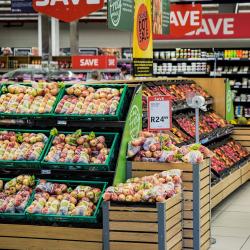Tips for Saving Money on Groceries
Saving money on groceries is a goal for many, especially as food prices fluctuate and household budgets tighten. While meal planning and coupon clipping might seem like the obvious strategies, there are many other effective ways to cut down on grocery bills without compromising on nutrition or taste. Here are some practical tips for saving money on groceries:
-
Make and Stick to a Shopping List:
Before heading to the store, plan your meals for the week and make a detailed shopping list. This helps avoid impulse buys and ensures you only purchase what you need. Stick to your list as much as possible to keep your spending in check. -
Utilize Digital Coupons and Store Apps:
Many grocery stores offer digital coupons and loyalty apps that provide discounts or cashback on certain items. Spend some time downloading these before shopping to maximize savings. -
Buy in Bulk:
Purchasing items in bulk can be more cost-effective, especially for non-perishable goods and items you use frequently, like grains, pasta, or toilet paper. Membership to wholesale clubs might come in handy for bulk shopping, though it’s essential to compare prices. -
Choose Store Brands:
Often, store brands are just as good as name brands but come at a fraction of the price. They’re usually manufactured by the same companies that produce the name-brand products, making them a cost-effective alternative without sacrificing quality. -
Shop Seasonal and Local Produce:
Fruits and vegetables that are in season are generally less expensive and fresher. Additionally, buying local produce supports your community and can sometimes be cheaper than imported goods. -
Limit Processed and Packaged Foods:
Ready-made meals and pre-packaged foods are convenient but often more expensive. By sticking to whole foods and preparing meals from scratch, you not only save money but also have control over your ingredients and portion sizes. -
Opt for Frozen Over Fresh:
If fresh produce tends to go bad before you consume it, consider buying frozen fruits and vegetables. They retain most of their nutrients and can be more economical, especially when out of season. -
Reduce Meat Consumption:
Meat often constitutes a large portion of grocery expenses. Incorporate more plant-based meals into your diet or use meat as a complementary ingredient rather than the main focus of your meals to save money and explore new recipes. -
Get Creative with Leftovers:
Avoid food waste by planning meals around leftovers or transforming them into new dishes. For example, turn roasted vegetables into a soup or yesterday’s chicken into today's stir-fry. -
Set a Budget and Track Expenses:
Determine a reasonable budget for your groceries and track your spending every month. This knowledge will help you adjust your habits and identify areas where you can cut back, ultimately keeping your finances in better shape. -
Check Expiry Dates and Shelf Life:
Be mindful of expiry dates and shelf life when shopping. Choose items with longer shelf lives to minimize food waste and ensure you consume everything you buy.
By implementing these strategies, you can efficiently manage your grocery bills and keep more money in your pocket. Saving on groceries doesn’t require sacrificing quality or variety; with a little planning and smart shopping, you can enjoy delicious meals while staying on budget.






















